八年级下>Unit 1 Past and Present
文档属性
| 名称 | 八年级下>Unit 1 Past and Present |  | |
| 格式 | zip | ||
| 文件大小 | 773.7KB | ||
| 资源类型 | 教案 | ||
| 版本资源 | 牛津译林版 | ||
| 科目 | 英语 | ||
| 更新时间 | 2014-03-13 15:06:43 | ||
图片预览



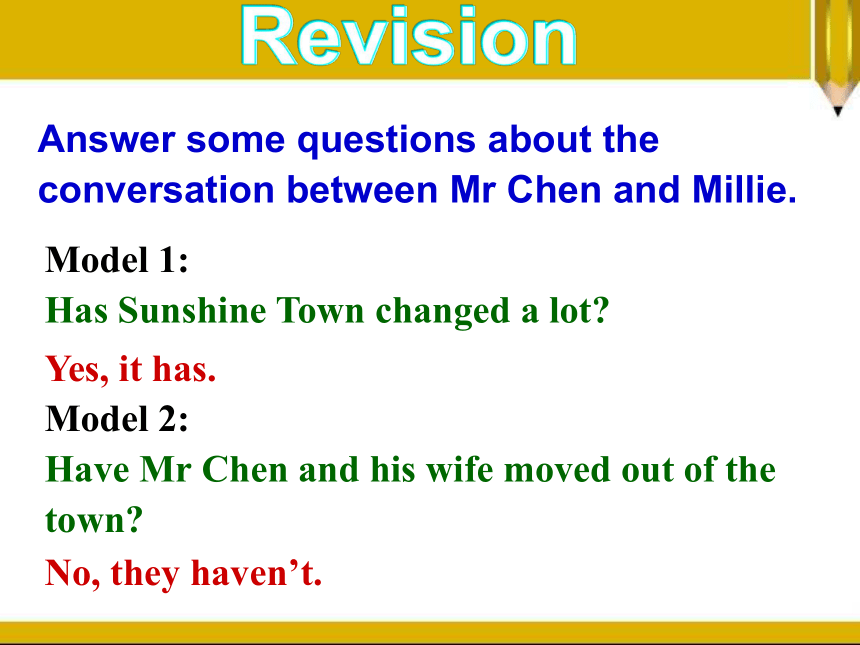
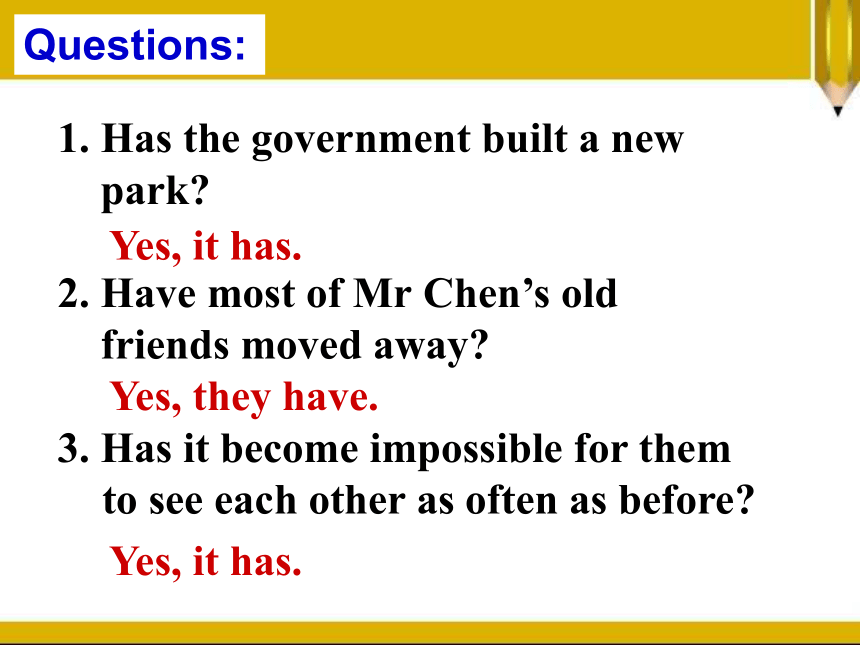
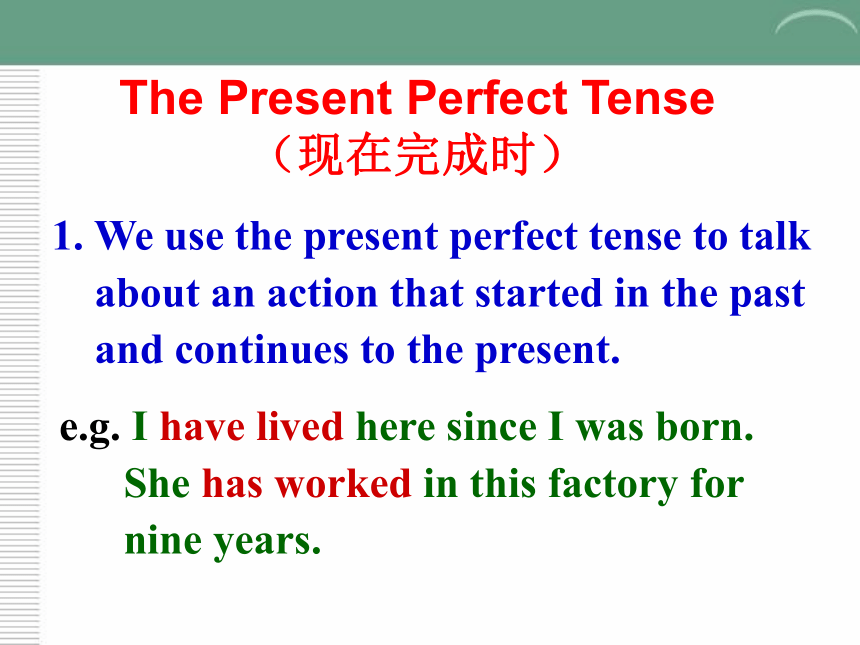
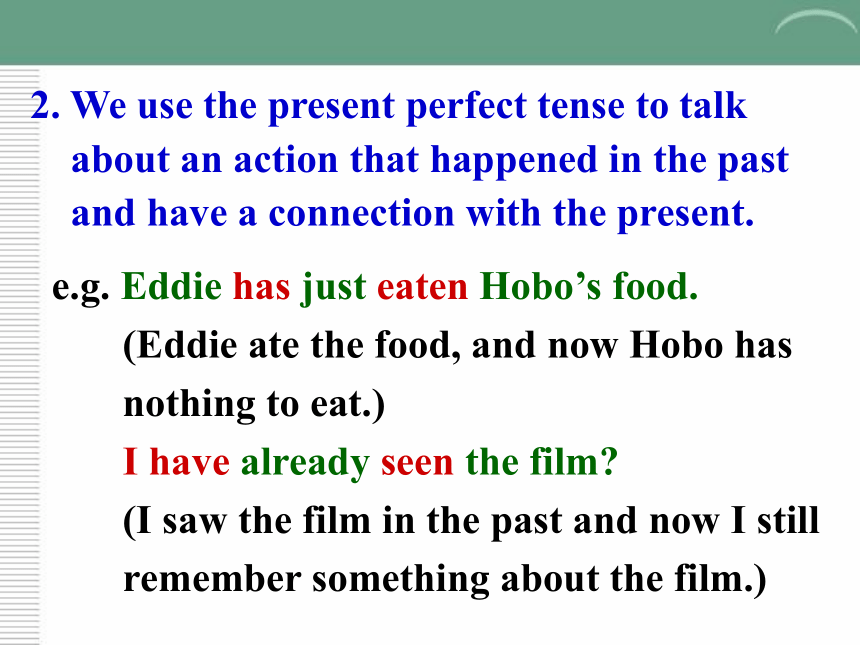
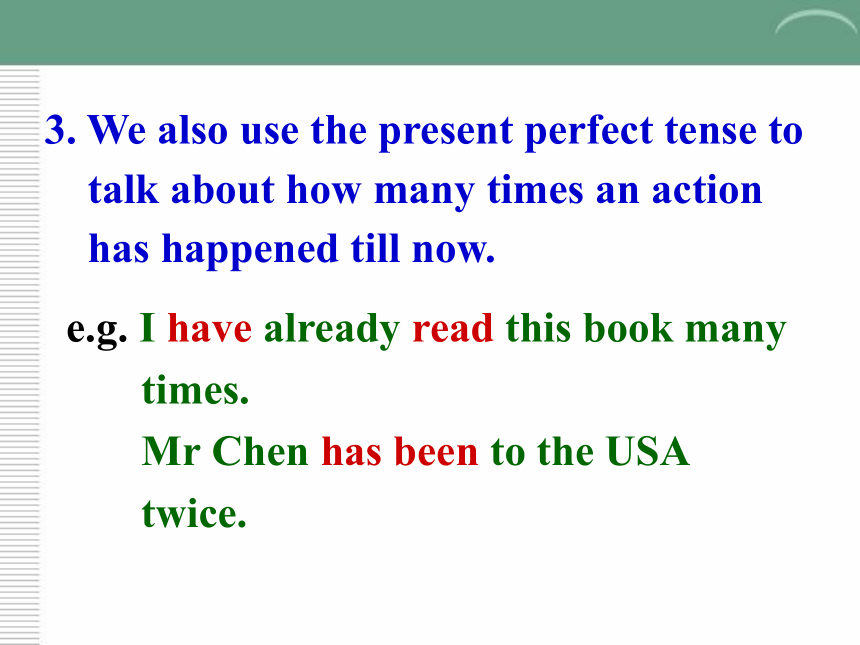
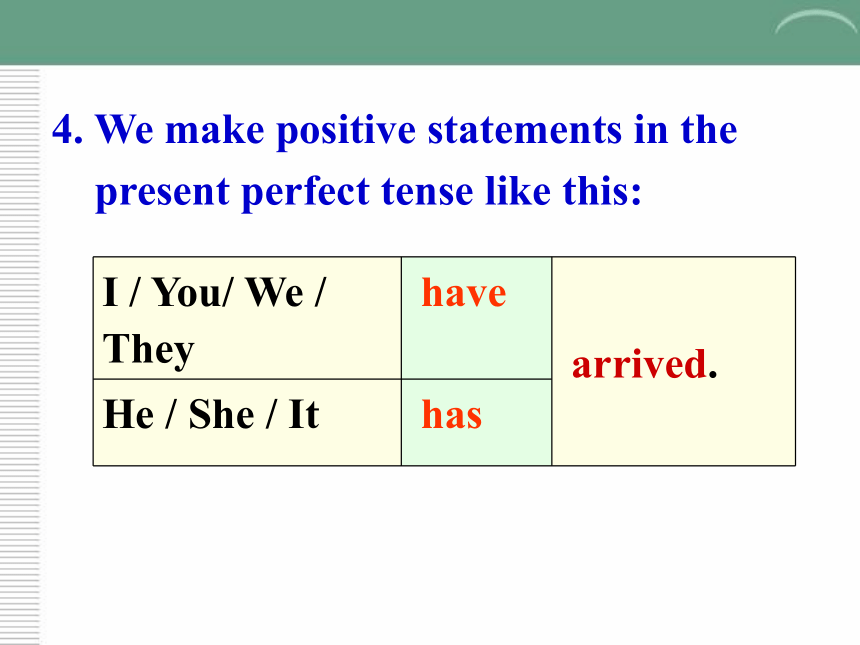
文档简介
课件28张PPT。Unit 1Unit 1
Past and presentGrammar
Present perfect tense Answer some questions about the conversation between Mr Chen and Millie.RevisionModel 1:
Has Sunshine Town changed a lot? Yes, it has.Model 2:
Have Mr Chen and his wife moved out of the town? No, they haven’t. Questions:1. Has the government built a new
park?
2. Have most of Mr Chen’s old
friends moved away?
3. Has it become impossible for them
to see each other as often as before?Yes, it has.Yes, they have.Yes, it has.The Present Perfect Tense
(现在完成时)1. We use the present perfect tense to talk
about an action that started in the past
and continues to the present.e.g. I have lived here since I was born.
She has worked in this factory for
nine years.2. We use the present perfect tense to talk
about an action that happened in the past
and have a connection with the present. e.g. Eddie has just eaten Hobo’s food.
(Eddie ate the food, and now Hobo has
nothing to eat.)
I have already seen the film?
(I saw the film in the past and now I still
remember something about the film.)3. We also use the present perfect tense to
talk about how many times an action
has happened till now.e.g. I have already read this book many
times.
Mr Chen has been to the USA
twice. 4. We make positive statements in the
present perfect tense like this:5. We make negative statements in
the present perfect tense like this:have not = haven’t
has not = hasn’t6. We ask and answer questions using the
present perfect tense like this:7. We form the past participles of
regular verbs by adding -ed, just as
what we do to form the simple past
tense of these verbs.8. We form the past participles of
irregular verbs differently. Here
are some examples.The following shows more examples of the past participles of some verbs.visit
repair
live
move
try
study
fit
planvisited
repaired
lived
moved
tried
studied
fitted
plannedBase form Past participleBase form Past participlehit
put
meet
make
sell
give
write
thinkhit
put
met
made
sold
given
written
thoughtA short testWrite the past participles of the verbs below. borrow plan say
hope cry grow
make send hit
get watch enjoyborrowed
hoped
made
gotten planned
cried
sent
watchedsaid
grown
hit
enjoyedComplete the sentences below using the present perfect tense. 1. They _____________ (finish) their
homework already.
2. John ____ never ______ (visit) China.
3. Mr Li ____________ (repair) over ten
bicycles since Monday.
4. We ____________ (not see) each other for years.have finishedhas visitedhas repairedhaven’t seen5. My parents _____________ (not come)
back yet.
6. Our teacher __________ (teach) us
a lot about the history of China.haven’t comehas taughtComplete the conversation. Use the correct form of the verbs in brackets.Millie: ______ you _____ (see) any films
recently, Sandy?
Sandy: No, I haven’t. What about you?
Millie: I _____ (see) one last Saturday.
Sandy: What’s it about?Have seensawMillie: It’s about the changes in Beijing
over the past century. From this
film, I ____________ (learn)
more about Beijing’s past and
present.
Sandy: Oh, I think I __________ (hear)
about the film. Do you plan to see
it again?
Millie: Yes, I’d like to.have learnthave heard一、现在完成时的构成:
1. 现在完成时的肯定句句型:
主语 + have /has + 过去分词…
e.g. He has lived in Beijing for ten years. I have finished my homework.
2. 现在完成时的否定句句型:
主语 + have/has + not + 过去分词 …
e.g. I have not seen the movie yet.
He hasn’t been to Beijing since then.语法小结3. 现在完成时一般疑问句的构成:
Have/ Has + 主语 + 过去分词 …?
Yes, 主语 + have/ has.
No, 主语 + haven’t/ hasn’t.
e.g. Have you finished your homework yet?
Yes, I have. / No, I haven’t. ★ haven’t = have not hasn’t = has not
I’ve = I have He’s = He has二、用法:以下两种情况应用现在完成时
1. 过去发生的动作或状态一直持续到现在。
e.g. He has lived here since he came to
Nanjing.
2. 过去完成的动作,但强调这个过去完成
的动作对现在有一定的影响或产生某种
结果。
e.g. I have seen that film already.
(I saw it in the past and now I can still
remember something about the film.)★ 一般过去时只用来表示过去发生了某
事,并不能表明对现在产生了什么影
响。e.g. He lost his mobile phone yesterday.
他昨天丢了手机。
(We don’t know whether he has found it
or not.) He has lost mobile phone already.
他已经把手机丢失了。
(He can’t use it right now.) 三、判断方法:
1. 依据用法,结合句意判断。
e.g. 他在这所学校教书有三年了。
He has taught at this school for 3 years.
2. 依据一些副词或时间状语判断。
现在完成时常和already, ever, just,
never, recently, yet等副词,以及since,
for引导的时间状语连用。
e.g. Have they arrived yet? ★ already “已经”常用于肯定句中,yet “还,仍然,已经”,常用于否定句和疑问句中。1. Review the summary on present
perfect tense.
2. Finish the exercises on the
workbook.Homework
Past and presentGrammar
Present perfect tense Answer some questions about the conversation between Mr Chen and Millie.RevisionModel 1:
Has Sunshine Town changed a lot? Yes, it has.Model 2:
Have Mr Chen and his wife moved out of the town? No, they haven’t. Questions:1. Has the government built a new
park?
2. Have most of Mr Chen’s old
friends moved away?
3. Has it become impossible for them
to see each other as often as before?Yes, it has.Yes, they have.Yes, it has.The Present Perfect Tense
(现在完成时)1. We use the present perfect tense to talk
about an action that started in the past
and continues to the present.e.g. I have lived here since I was born.
She has worked in this factory for
nine years.2. We use the present perfect tense to talk
about an action that happened in the past
and have a connection with the present. e.g. Eddie has just eaten Hobo’s food.
(Eddie ate the food, and now Hobo has
nothing to eat.)
I have already seen the film?
(I saw the film in the past and now I still
remember something about the film.)3. We also use the present perfect tense to
talk about how many times an action
has happened till now.e.g. I have already read this book many
times.
Mr Chen has been to the USA
twice. 4. We make positive statements in the
present perfect tense like this:5. We make negative statements in
the present perfect tense like this:have not = haven’t
has not = hasn’t6. We ask and answer questions using the
present perfect tense like this:7. We form the past participles of
regular verbs by adding -ed, just as
what we do to form the simple past
tense of these verbs.8. We form the past participles of
irregular verbs differently. Here
are some examples.The following shows more examples of the past participles of some verbs.visit
repair
live
move
try
study
fit
planvisited
repaired
lived
moved
tried
studied
fitted
plannedBase form Past participleBase form Past participlehit
put
meet
make
sell
give
write
thinkhit
put
met
made
sold
given
written
thoughtA short testWrite the past participles of the verbs below. borrow plan say
hope cry grow
make send hit
get watch enjoyborrowed
hoped
made
gotten planned
cried
sent
watchedsaid
grown
hit
enjoyedComplete the sentences below using the present perfect tense. 1. They _____________ (finish) their
homework already.
2. John ____ never ______ (visit) China.
3. Mr Li ____________ (repair) over ten
bicycles since Monday.
4. We ____________ (not see) each other for years.have finishedhas visitedhas repairedhaven’t seen5. My parents _____________ (not come)
back yet.
6. Our teacher __________ (teach) us
a lot about the history of China.haven’t comehas taughtComplete the conversation. Use the correct form of the verbs in brackets.Millie: ______ you _____ (see) any films
recently, Sandy?
Sandy: No, I haven’t. What about you?
Millie: I _____ (see) one last Saturday.
Sandy: What’s it about?Have seensawMillie: It’s about the changes in Beijing
over the past century. From this
film, I ____________ (learn)
more about Beijing’s past and
present.
Sandy: Oh, I think I __________ (hear)
about the film. Do you plan to see
it again?
Millie: Yes, I’d like to.have learnthave heard一、现在完成时的构成:
1. 现在完成时的肯定句句型:
主语 + have /has + 过去分词…
e.g. He has lived in Beijing for ten years. I have finished my homework.
2. 现在完成时的否定句句型:
主语 + have/has + not + 过去分词 …
e.g. I have not seen the movie yet.
He hasn’t been to Beijing since then.语法小结3. 现在完成时一般疑问句的构成:
Have/ Has + 主语 + 过去分词 …?
Yes, 主语 + have/ has.
No, 主语 + haven’t/ hasn’t.
e.g. Have you finished your homework yet?
Yes, I have. / No, I haven’t. ★ haven’t = have not hasn’t = has not
I’ve = I have He’s = He has二、用法:以下两种情况应用现在完成时
1. 过去发生的动作或状态一直持续到现在。
e.g. He has lived here since he came to
Nanjing.
2. 过去完成的动作,但强调这个过去完成
的动作对现在有一定的影响或产生某种
结果。
e.g. I have seen that film already.
(I saw it in the past and now I can still
remember something about the film.)★ 一般过去时只用来表示过去发生了某
事,并不能表明对现在产生了什么影
响。e.g. He lost his mobile phone yesterday.
他昨天丢了手机。
(We don’t know whether he has found it
or not.) He has lost mobile phone already.
他已经把手机丢失了。
(He can’t use it right now.) 三、判断方法:
1. 依据用法,结合句意判断。
e.g. 他在这所学校教书有三年了。
He has taught at this school for 3 years.
2. 依据一些副词或时间状语判断。
现在完成时常和already, ever, just,
never, recently, yet等副词,以及since,
for引导的时间状语连用。
e.g. Have they arrived yet? ★ already “已经”常用于肯定句中,yet “还,仍然,已经”,常用于否定句和疑问句中。1. Review the summary on present
perfect tense.
2. Finish the exercises on the
workbook.Homework
